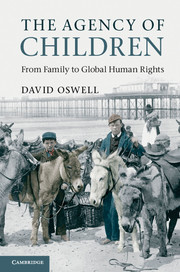Book contents
- Frontmatter
- Contents
- Figures
- Acknowledgements
- Part I Introduction
- Part II Social theories of children and childhood
- Part III
- 6 Family and household
- 7 School and education
- 8 Crime and criminality
- 9 Health and medicine
- 10 Play and consumer culture
- 11 Political economies of labour
- 12 Rights and political participation
- Part IV Conclusions
- Bibliography
- Index
12 - Rights and political participation
Published online by Cambridge University Press: 05 April 2013
- Frontmatter
- Contents
- Figures
- Acknowledgements
- Part I Introduction
- Part II Social theories of children and childhood
- Part III
- 6 Family and household
- 7 School and education
- 8 Crime and criminality
- 9 Health and medicine
- 10 Play and consumer culture
- 11 Political economies of labour
- 12 Rights and political participation
- Part IV Conclusions
- Bibliography
- Index
Summary
In this chapter I consider the issue of children’s rights and political participation. Of course, although we might endow ceteris paribus any persons or even things with legal rights, not everyone or thing is deemed to have the capacity for political participation. Initially, we will consider some of the philosophical and cultural history attached to the question of children as rights bearers and as political animals. We then consider how the capacity for modern rights and political participation is distributed unevenly across the globe and discuss this in the context of the universalisation of children’s rights, as enshrined, for example, in the United Nations Convention on the Rights of the Child (UNCRC). Finally in this chapter we ground the questions of children’s rights and politics in the context of national sovereignty, modern forms of governmentality and forms of political enunciation, or expression. As Hannah Arendt declared after the Second World War, ‘only with a completely organized humanity could the loss of home and political status become identical with expulsion from humanity altogether’ (Arendt, 1962: 297). The question regarding children, though, is doubly confounded in that ordinarily the constitution of their very being (with regard to their infancy and lack of maturity) places them a priori outside of both the political and global humanity.
- Type
- Chapter
- Information
- The Agency of ChildrenFrom Family to Global Human Rights, pp. 234 - 260Publisher: Cambridge University PressPrint publication year: 2012



